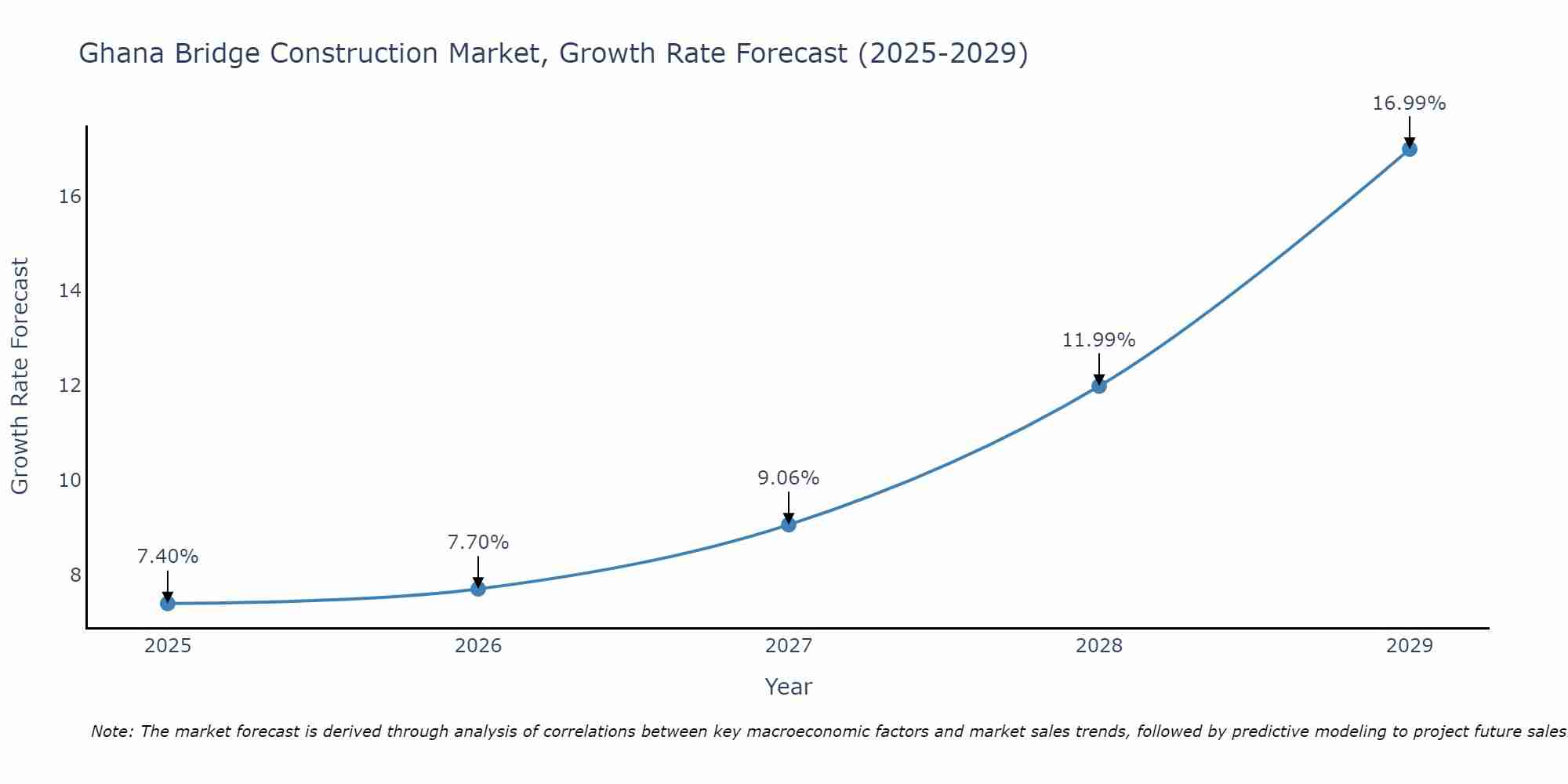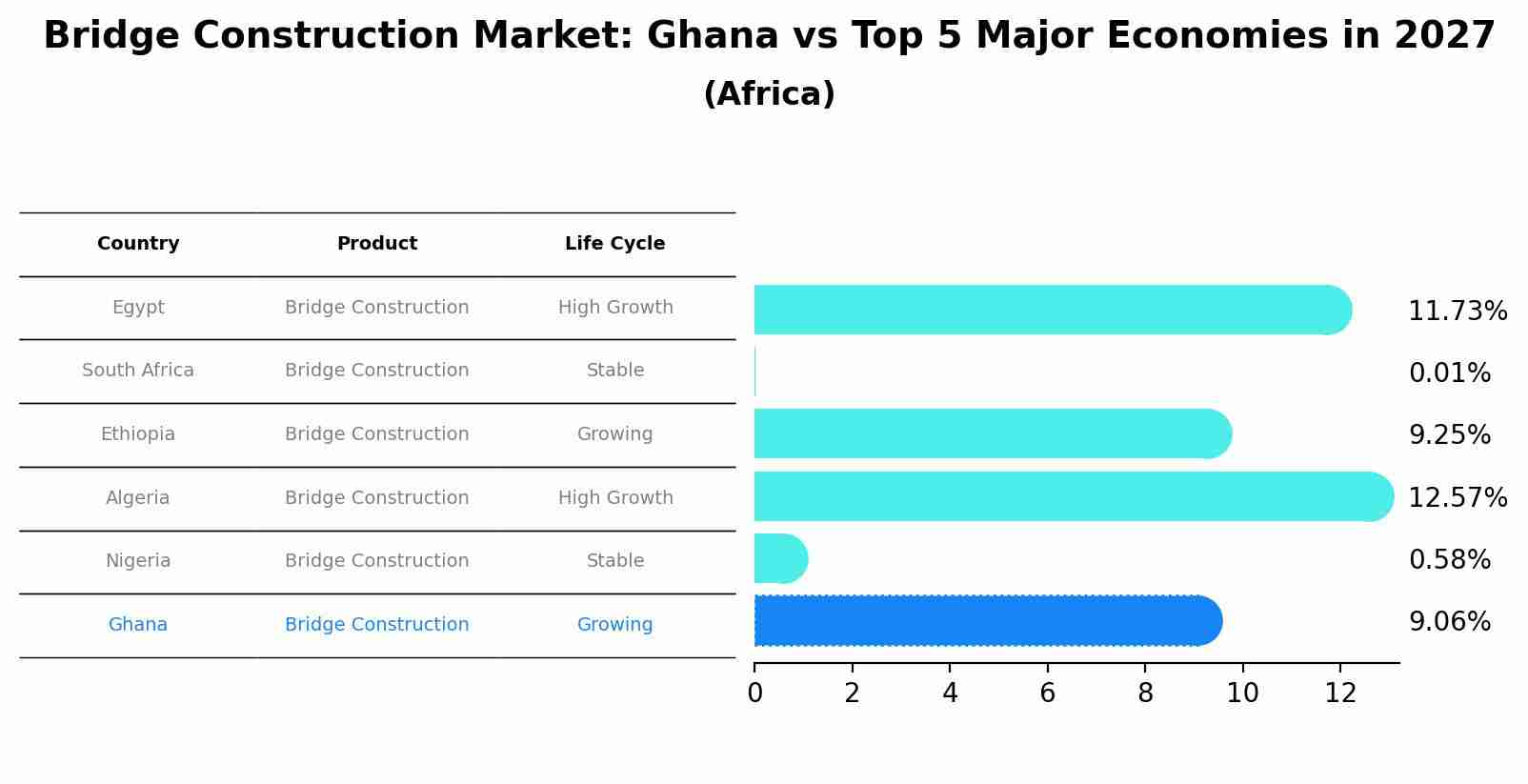Ghana Bridge Construction Market (2025-2031) Outlook | Size, Trends, Analysis, Value, Companies, Growth, Share, Forecast, Industry & Revenue
| Product Code: ETC360116 | Publication Date: Aug 2022 | Updated Date: Aug 2025 | Product Type: Market Research Report | |
| Publisher: 6Wresearch | Author: Shubham Deep | No. of Pages: 75 | No. of Figures: 35 | No. of Tables: 20 |
Ghana Bridge Construction Market Size Growth Rate
The Ghana Bridge Construction Market is likely to experience consistent growth rate gains over the period 2025 to 2029. Commencing at 7.40% in 2025, growth builds up to 16.99% by 2029.

Bridge Construction Market: Ghana vs Top 5 Major Economies in 2027 (Africa)
By 2027, the Bridge Construction market in Ghana is anticipated to reach a growth rate of 9.06%, as part of an increasingly competitive Africa region, where Egypt remains at the forefront, supported by South Africa, Ethiopia, Algeria and Nigeria, driving innovations and market adoption across sectors.

Ghana Bridge Construction Market Synopsis
The Ghana bridge construction market is experiencing steady growth driven by infrastructure development initiatives and increasing urbanization. Key factors driving market growth include government investments in road and transportation infrastructure, the expansion of the construction sector, and the demand for modern and efficient transportation networks. Local and international construction companies are actively involved in bridge construction projects, with a focus on enhancing connectivity, improving logistics, and fostering economic development. The market is characterized by the construction of various types of bridges, including highway bridges, pedestrian bridges, and railway bridges. Challenges such as funding constraints, regulatory hurdles, and environmental concerns are present but are being addressed through collaborations between government agencies, private sector stakeholders, and development partners to ensure sustainable and inclusive growth in the bridge construction sector.
Ghana Bridge Construction Market Trends
In the Ghana Bridge Construction Market, several key trends are emerging. First, there is a growing emphasis on sustainable and environmentally-friendly construction practices, with a focus on using durable materials and innovative engineering techniques to minimize the environmental impact of bridge projects. Second, there is a rising demand for infrastructure development, driven by urbanization and the need to improve connectivity between different regions. This has led to an increase in the number of bridge construction projects across the country. Additionally, there is a push towards incorporating smart technologies and digital tools in bridge design and construction to enhance efficiency and safety. Overall, the Ghana Bridge Construction Market is experiencing a shift towards sustainability, innovation, and improved infrastructure to support the country`s economic growth and development.
Ghana Bridge Construction Market Challenges
In the Ghana Bridge Construction Market, some of the main challenges faced include limited financing options, inadequate infrastructure development, regulatory hurdles, and skilled labor shortages. Securing funding for bridge projects can be challenging due to limited financial resources and access to affordable financing. Additionally, the lack of well-developed infrastructure, such as reliable transportation networks and construction equipment, can hinder the efficiency and timely completion of bridge projects. Regulatory processes and bureaucratic red tape can also create delays and increase project costs. Furthermore, there is a shortage of skilled labor in the construction industry, leading to potential quality issues and project delays. Addressing these challenges will be crucial for the sustainable growth and development of the bridge construction sector in Ghana.
Ghana Bridge Construction Market Investment Opportunities
The Ghana bridge construction market presents lucrative investment opportunities due to the country`s growing infrastructure development initiatives. With increasing urbanization and population growth, demand for modern and efficient transportation networks is on the rise, driving the need for new bridge construction projects. Investors can capitalize on this by participating in public-private partnerships (PPPs) with the Ghanaian government, seeking out bridge construction contracts from government agencies or private developers, or investing in companies specializing in bridge construction technology and materials. Additionally, the government`s commitment to enhancing connectivity through various infrastructure projects creates a favorable environment for long-term returns on investments in the Ghana bridge construction market.
Jordan Agar Market Government Policies
In Ghana, the government has been actively pursuing infrastructure development projects, including the construction of bridges, to improve connectivity and foster economic growth. Government policies related to the Ghana bridge construction market focus on ensuring transparency and competitiveness in the tendering process, promoting local content participation to enhance skills development and job creation, and maintaining quality standards to guarantee the durability and safety of the infrastructure. Additionally, the government has implemented measures to attract foreign investment and expertise to support the development of bridge projects in the country. Overall, the government`s policies aim to spur sustainable development in the Ghana bridge construction market while also prioritizing the welfare and interests of local communities and stakeholders.
Ghana Bridge Construction Market Future Outlook
The outlook for the Ghana Bridge Construction Market appears promising in the coming years due to the country`s continued investment in infrastructure development. With a growing population and increasing urbanization, there is a rising demand for new bridges to improve connectivity and facilitate transportation across different regions. The government`s focus on enhancing the country`s infrastructure to support economic growth and development further boosts the potential for the bridge construction market. Additionally, the increasing emphasis on sustainable and resilient infrastructure solutions is likely to drive innovation and investment in bridge construction technologies and materials. Overall, the Ghana Bridge Construction Market is expected to experience steady growth driven by ongoing infrastructure projects and the need to address the country`s transportation and connectivity challenges.
Key Highlights of the Report:
- Ghana Bridge Construction Market Outlook
- Market Size of Ghana Bridge Construction Market, 2024
- Forecast of Ghana Bridge Construction Market, 2031
- Historical Data and Forecast of Ghana Bridge Construction Revenues & Volume for the Period 2021 - 2031
- Ghana Bridge Construction Market Trend Evolution
- Ghana Bridge Construction Market Drivers and Challenges
- Ghana Bridge Construction Price Trends
- Ghana Bridge Construction Porter's Five Forces
- Ghana Bridge Construction Industry Life Cycle
- Historical Data and Forecast of Ghana Bridge Construction Market Revenues & Volume By Type for the Period 2021 - 2031
- Historical Data and Forecast of Ghana Bridge Construction Market Revenues & Volume By Beam Bridge for the Period 2021 - 2031
- Historical Data and Forecast of Ghana Bridge Construction Market Revenues & Volume By Truss Bridge for the Period 2021 - 2031
- Historical Data and Forecast of Ghana Bridge Construction Market Revenues & Volume By Arch Bridge for the Period 2021 - 2031
- Historical Data and Forecast of Ghana Bridge Construction Market Revenues & Volume By Suspension Bridge for the Period 2021 - 2031
- Historical Data and Forecast of Ghana Bridge Construction Market Revenues & Volume By Cable-Stayed Bridge for the Period 2021 - 2031
- Historical Data and Forecast of Ghana Bridge Construction Market Revenues & Volume By Others for the Period 2021 - 2031
- Historical Data and Forecast of Ghana Bridge Construction Market Revenues & Volume By Material for the Period 2021 - 2031
- Historical Data and Forecast of Ghana Bridge Construction Market Revenues & Volume By Steel for the Period 2021 - 2031
- Historical Data and Forecast of Ghana Bridge Construction Market Revenues & Volume By Concrete for the Period 2021 - 2031
- Historical Data and Forecast of Ghana Bridge Construction Market Revenues & Volume By Composite Material for the Period 2021 - 2031
- Historical Data and Forecast of Ghana Bridge Construction Market Revenues & Volume By Application for the Period 2021 - 2031
- Historical Data and Forecast of Ghana Bridge Construction Market Revenues & Volume By Road & Highway for the Period 2021 - 2031
- Historical Data and Forecast of Ghana Bridge Construction Market Revenues & Volume By Railway for the Period 2021 - 2031
- Ghana Bridge Construction Import Export Trade Statistics
- Market Opportunity Assessment By Type
- Market Opportunity Assessment By Material
- Market Opportunity Assessment By Application
- Ghana Bridge Construction Top Companies Market Share
- Ghana Bridge Construction Competitive Benchmarking By Technical and Operational Parameters
- Ghana Bridge Construction Company Profiles
- Ghana Bridge Construction Key Strategic Recommendations
Frequently Asked Questions About the Market Study (FAQs):
- Single User License$ 1,995
- Department License$ 2,400
- Site License$ 3,120
- Global License$ 3,795
Search
Related Reports
- Vietnam System Integrator Market (2025-2031) | Size, Companies, Analysis, Industry, Value, Forecast, Growth, Trends, Revenue & Share
- ASEAN and Thailand Brain Health Supplements Market (2025-2031) | Strategy, Consumer Insights, Analysis, Investment Trends, Opportunities, Growth, Size, Share, Industry, Revenue, Segments, Value, Segmentation, Supply, Forecast, Restraints, Outlook, Competition, Drivers, Trends, Demand, Pricing Analysis, Competitive, Strategic Insights, Companies, Challenges
- ASEAN Bearings Market (2025-2031) | Strategy, Consumer Insights, Analysis, Investment Trends, Opportunities, Growth, Size, Share, Industry, Revenue, Segments, Value, Segmentation, Supply, Forecast, Restraints, Outlook, Competition, Drivers, Trends, Demand, Pricing Analysis, Competitive, Strategic Insights, Companies, Challenges
- Europe Flooring Market (2025-2031) | Outlook, Share, Industry, Trends, Forecast, Companies, Revenue, Size, Analysis, Growth & Value
- Saudi Arabia Manlift Market (2025-2031) | Outlook, Size, Growth, Trends, Companies, Industry, Revenue, Value, Share, Forecast & Analysis
- Uganda Excavator, Crane, and Wheel Loaders Market (2025-2031) | Strategy, Consumer Insights, Analysis, Investment Trends, Opportunities, Growth, Size, Share, Industry, Revenue, Segments, Value, Segmentation, Supply, Forecast, Restraints, Outlook, Competition, Drivers, Trends, Demand, Pricing Analysis, Competitive, Strategic Insights, Companies, Challenges
- Rwanda Excavator, Crane, and Wheel Loaders Market (2025-2031) | Strategy, Consumer Insights, Analysis, Investment Trends, Opportunities, Growth, Size, Share, Industry, Revenue, Segments, Value, Segmentation, Supply, Forecast, Restraints, Outlook, Competition, Drivers, Trends, Demand, Pricing Analysis, Competitive, Strategic Insights, Companies, Challenges
- Kenya Excavator, Crane, and Wheel Loaders Market (2025-2031) | Strategy, Consumer Insights, Analysis, Investment Trends, Opportunities, Growth, Size, Share, Industry, Revenue, Segments, Value, Segmentation, Supply, Forecast, Restraints, Outlook, Competition, Drivers, Trends, Demand, Pricing Analysis, Competitive, Strategic Insights, Companies, Challenges
- Angola Excavator, Crane, and Wheel Loaders Market (2025-2031) | Strategy, Consumer Insights, Analysis, Investment Trends, Opportunities, Growth, Size, Share, Industry, Revenue, Segments, Value, Segmentation, Supply, Forecast, Restraints, Outlook, Competition, Drivers, Trends, Demand, Pricing Analysis, Competitive, Strategic Insights, Companies, Challenges
- Israel Intelligent Transport System Market (2025-2031) | Strategy, Consumer Insights, Analysis, Investment Trends, Opportunities, Growth, Size, Share, Industry, Revenue, Segments, Value, Segmentation, Supply, Forecast, Restraints, Outlook, Competition, Drivers, Trends, Demand, Pricing Analysis, Competitive, Strategic Insights, Companies, Challenges
Industry Events and Analyst Meet
Our Clients
Whitepaper
- Middle East & Africa Commercial Security Market Click here to view more.
- Middle East & Africa Fire Safety Systems & Equipment Market Click here to view more.
- GCC Drone Market Click here to view more.
- Middle East Lighting Fixture Market Click here to view more.
- GCC Physical & Perimeter Security Market Click here to view more.
6WResearch In News
- Doha a strategic location for EV manufacturing hub: IPA Qatar
- Demand for luxury TVs surging in the GCC, says Samsung
- Empowering Growth: The Thriving Journey of Bangladesh’s Cable Industry
- Demand for luxury TVs surging in the GCC, says Samsung
- Video call with a traditional healer? Once unthinkable, it’s now common in South Africa
- Intelligent Buildings To Smooth GCC’s Path To Net Zero













